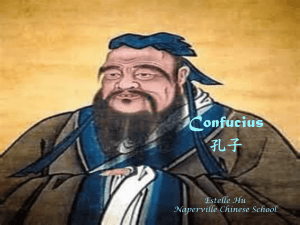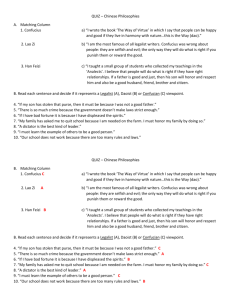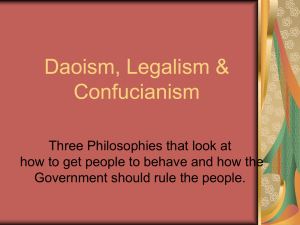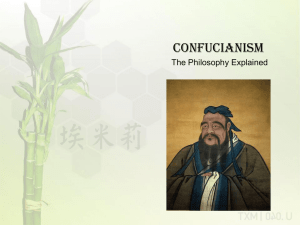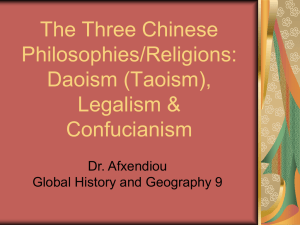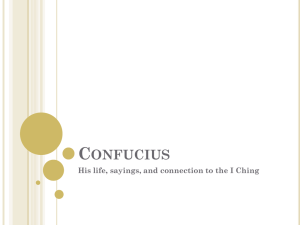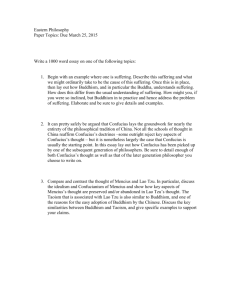The Place of the Analects in a Global Liberal Arts Curriculum.
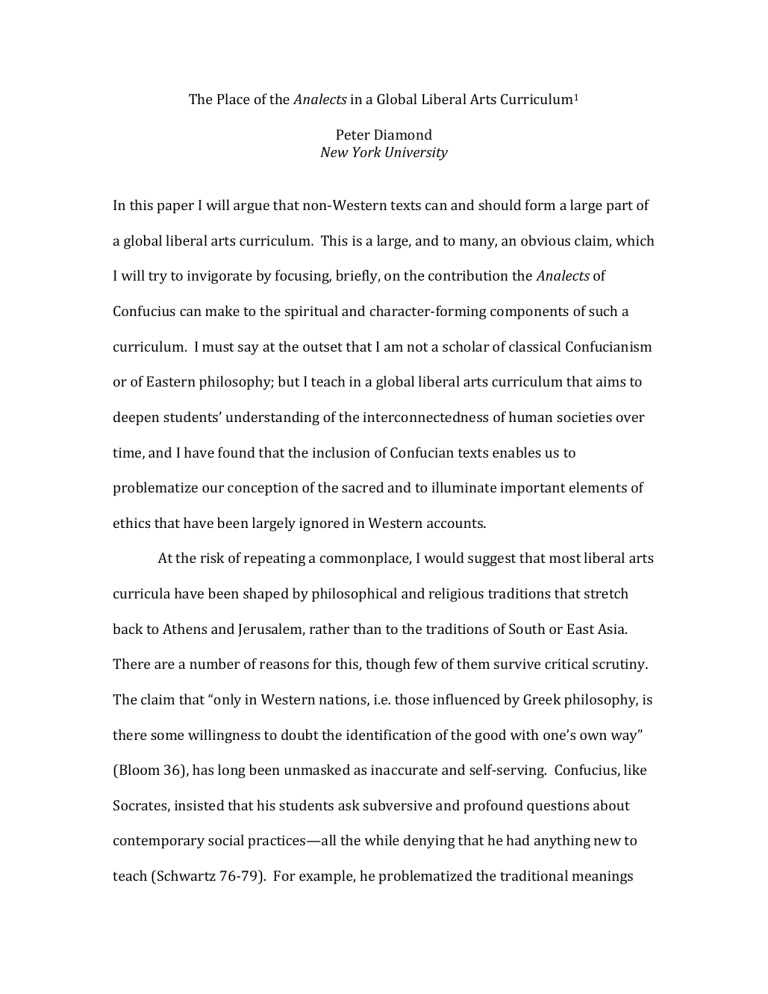
The Place of the Analects in a Global Liberal Arts Curriculum 1
Peter Diamond
New York University
In this paper I will argue that non-Western texts can and should form a large part of a global liberal arts curriculum. This is a large, and to many, an obvious claim, which
I will try to invigorate by focusing, briefly, on the contribution the Analects of
Confucius can make to the spiritual and character-forming components of such a curriculum. I must say at the outset that I am not a scholar of classical Confucianism or of Eastern philosophy; but I teach in a global liberal arts curriculum that aims to deepen students’ understanding of the interconnectedness of human societies over time, and I have found that the inclusion of Confucian texts enables us to problematize our conception of the sacred and to illuminate important elements of ethics that have been largely ignored in Western accounts.
At the risk of repeating a commonplace, I would suggest that most liberal arts curricula have been shaped by philosophical and religious traditions that stretch back to Athens and Jerusalem, rather than to the traditions of South or East Asia.
There are a number of reasons for this, though few of them survive critical scrutiny.
The claim that “only in Western nations, i.e. those influenced by Greek philosophy, is there some willingness to doubt the identification of the good with one’s own way”
(Bloom 36), has long been unmasked as inaccurate and self-serving. Confucius, like
Socrates, insisted that his students ask subversive and profound questions about contemporary social practices—all the while denying that he had anything new to teach (Schwartz 76-79). For example, he problematized the traditional meanings
2 assigned to familiar terms like benevolence (ren), rite or ceremony (li), and the exemplary person (junzi) in a way that was designed to destabilize the contemporary meaning of those terms. We should also treat with skepticism the anachronistic assumption that since philosophy requires a “clear, articulate, discussible system of ideas and principles,” then “what is commonly called ‘Chinese philosophy’ … consists almost entirely of the pronouncements of sages" (qtd in
Salkever and Nylan 240). This rather limited conception of philosophy dates from the efforts of seventeenth-century European philosophers to establish a basis of certainty for scientific inquiry. It survives, of course, within the modern Anglo-
American analytic philosophical tradition, but it is a conception of philosophy that excludes not just Chinese philosophy, but most East and South Asian thought, as well as much pre-modern and post-modern European philosophy as well, including the writings of Nietzsche as well as the late Wittgenstein. Thanks to the groundbreaking work of scholars such as Herbert Fingarette, Henry Rosemont,
David Hall and Roger Ames, few any longer view Confucius as “an apologist for a feudal code of ethics” (Hansen 204), but rather as the originator of a philosophical classic that explores in great depth the ethical importance of personal relationships.
It is also sometimes claimed that Confucianism is not a religious tradition capable of offering genuinely spiritual insight. Here too, a variety of reasons have been given. Some scholars contend that Confucianism is more an ethical teaching than a religion because it is focused on establishing proper relationships between persons. Indeed, the Analects offers little that points beyond self and society. From this standpoint, Confucianism lacks a concept of the transcendent and therefore is
3 seen by some as not fulfilling a basic requirement of what constitutes a religion. But this perspective involves an unduly narrow conception of religion, one that sees religion as dependent upon a theistic notion of a God transcendent of humanity. As
Rodney Taylor has argued, to the extent that the Confucian effort to achieve human perfection involves transformation in the direction of a moral absolute, this activity arguably has a religious character (80, 87-90).
Much turns on this issue. For those of us at home in the Western tradition take for granted that there is a privileged or transcendent position outside the world from which objective and hence universal statements about it can be made— statements about the nature of justice or human rights, or of what it means to be human. The inclusion of Asian, and more specifically, Confucian texts can help to problematize this assumption in quite provocative and hence useful ways. Before elaborating on this claim, I need to say more about the role of Judeo-Christianity in shaping the history of our ethical commitments.
According to the Abrahamic tradition, where God is the transcendent source and standard of meaning and value, religiousness is expressed as worship. When the author of The Book of Job had his protagonist say to one of his interlocutors, “If only there were an arbiter / who could lay his hand on us both, / who could make you put down your club / and hold back your terrible arm. / Then, without fear, I would say, / You have not treated me justly” (29), the author at once reaffirmed and undermined the view that we worship God and follow His commands out of blind faith in the terms of the Covenant. It was not until Paul sought to turn what was a
Jewish sect into a world religion—by showing that Jesus’ message was meant for
4
Gentiles as well as Jews—that the moral law was given a rational foundation. Paul argued that the Greeks and the Romans had understood the laws the Jews had received by divine revelation by unaided reason. “When Gentiles, who do not possess the law, do instinctively what the law requires,” Paul argued, “these, though not having the law, are a law to themselves. They show that what the law requires is written on their hearts, to which their own conscience bears witness” (Romans
2.14-15). The history of early modern and modern ethics is the story of
Europeans—many of them sincere Christians—rejecting the view that the authority of moral principles is rooted in God’s will, made known to us by his commands and given effect by his sanctions. What is important for the purposes of this story is that their rejection of “voluntarism” often had its source in convictions about what our relation to God ought to be like. Piety, they believed, is not servile obedience. There can be no sense in loving God or in praising His justice, if we reckon the good and the right to be merely the creatures of God’s will. We worship God as we should,
Leibniz argued, when we recognize that we belong to a single moral community governed by principles that are fixed independently of any choice by God
(Schneewind 239-40). In this way, modern ethics took shape within a worldview that was still informed by religious belief.
As Charles Larmore has argued, this image of a single moral community embracing God and man helped to perpetuate the idea that our knowledge of moral truth has no need of faith. Nevertheless, Christianity did leave its mark on our ethical sensibilities, by compelling early modern philosophers to seek their ancient models in the ethics of the Stoics rather than in the ethics of Aristotle. Minimizing
5 the value of rules, Aristotle portrayed virtue as the art of judgment, the knack of sizing up the particular situation at hand. For the moderns, by contrast, virtue entailed the conscientious adherence to principles that transcend the human condition (43). The modern descendants of Hume and Kant have largely abandoned the religious conception that the moral principles to which we adhere are of God’s making. Whether it necessarily follows from their arguments that morality is essentially a matter of giving ourselves rules, is a matter best left aside for now. But it is worth noting that recent arguments to the effect that secularization has deprived the modern world of any worthwhile experience of the sacred—Charles Taylor’s A Secular Age is one such argument—neglect (or refuse) to acknowledge that there are many modes of the sacred and that the Christian religion (for example) is merely one historical instance of sacred experience among many.
Ancient Chinese philosophers in general, and Confucius in particular, took a very different approach to the pursuit of virtue than their Greek and Abrahamic peers. Instead of assuming, as they did, that the world is in principle explanatorily intelligible (as Socrates believed), or that God created the world for a purpose, and according to a plan (as the three Abrahamic religions affirm) that can be understood, albeit imperfectly, and followed, Confucius took the world as he found it. As Ames and Rosemont have argued in their Introduction to the Analects, “for the ancient Chinese…, the appearances were not deceptive, and the what and the why of the world (the existence of some underlying ultimate reality) does not seem to have preoccupied them” (32-33). Confucius was consequently less concerned with
6 describing and thereby conveying knowledge about the world than he was to have his students learn how to get on in the world, and this meant learning to experience, to interpret, and to influence the world in such as way as to reinforce and extend the way of life of one’s cultural predecessors. “It is person who is able to broaden the way (dao),” Confucius declared, “not the way that broadens the person” (15.29).
2
How does one broaden the way? By learning to become ren, which has often translated as benevolence, or humaneness, or “authoritative conduct,” as Ames and
Rosemont have rendered this notoriously difficult Chinese term. For Confucius, becoming ren was the arduous task of a lifetime, which involved learning to cultivate one’s cognitive, aesthetic, moral, and religious sensibilities as they are expressed in li, in one’s ritualized roles and relationships. Confucius is often depicted as a traditionalist, but he was less concerned with how people have behaved over time, than with valorizing the finest examples of humane conduct, which he attributed to the sages of ancient times (Fingarette 1983, 335). “Following the proper way,” said Confucius, “I do not forge new paths; with confidence I cherish the ancients—in these respects I am comparable to our venerable Old Peng” (7.1; my emphasis). It was Confucius’ life-long mission to restore the value of rituals and to teach people to foster a sense of community in all their actions. To put it succinctly, one becomes ren by learning to embody li (Fingarette 1972, 42).
The substantive wisdom that Confucius taught was not loyalty to tradition, then, but rather the intrinsic wisdom of recognizing a range of social obligations: to one’s family, first and foremost, and then to the larger social world. This entailed far more than merely fulfilling certain obligations and following certain practices and
7 norms. Each of one’s actions had to be performed with the genuine and appropriate attitude for each occasion and an active commitment to adjusting one’s conduct to the precise demands of each particular occasion (Ivanhoe 2). As Confucius explained, “Deference unmediated by observing ritual propriety is lethargy; caution unmediated by observing ritual propriety is timidity; boldness unmediated by observing ritual propriety is rowdiness; candor unmediated by observing ritual propriety is rudeness” (8.2). This passage and others like it lend credence to the view that Confucius espoused a form of virtue ethics, which depends on the development of various and creative human excellences rather than on utilitarian calculations of non-moral good or on Kantian rule following.
By focusing on the importance of observing ritual propriety, we can also gain a sense of what Herbert Fingarette has called “the spiritual-moral dimension of human existence,” which for Confucius inheres in public acts of human intercourse that express mutual loyalty and respect. Such acts, Fingarette explains, “constitute civilized, i.e. truly human patterns of mourning, marrying and fighting, of being a prince, a father, a son and so on.” Rather than being formulaic or mechanical routines in the service of some cosmic or social law, they are creative and civilized performances expressive of spontaneous and cooperative action. Fingarette argues that it was Confucius’ novel and creative insight to see this aspect of human existence as “sacred” or even “magical.” 3 Our lives are filled with such rituals, which may be understood as religious or sacred insofar as they are directed toward the perfection of humankind. For Confucius such perfection was embodied in the goal of sagehood, and represented by a set of rulers who were purported to have existed
8 at the beginning of the Chinese cultural tradition. While Confucius did not regard sagehood as an attainable goal, it was possible to become an exemplary person
(junzi). While the exemplary person is not entirely perfect, he nevertheless performs all his functions with the utmost propriety, and his conduct is never forced, but rather effortless, spontaneous, and creative. There are a number of passages in the Analects in which Confucius suggests that in a well-governed state the ruler treats his subjects “as beings of equal dignity, as free co-participants in li”
(Fingarette 1972, 16). “If you govern effectively,” said Confucius, “what need is there for killing? If you want to be truly adept, the people will also be adept. The excellence of the exemplary person is the wind, while that of the petty person is the grass. As the wind blows, the grass is sure to bend” (12.19).
Confucius sharply contrasted the ruler who uses li with the ruler who
“lead[s] the people with administrative injunctions and [who] keeps[s] them orderly with penal law” (2.3). Such people may well be orderly, but they will lack honor and dignity. If we put Confucius’ warning in a modern frame, we might well point to the spiritual callousness that so often permeates our politics. An unwillingness or inability to grasp subtle distinctions, “emotional and intellectual habits become bogus from repetition and lack of examination, unreal loyalties, delusive aims, [and] false significances” (Oakeshott 93)—these are the unfortunate hallmarks of our public discourse. Such limitations are commonly understood to be the cost of our emphasis on impersonal justice, which makes possible both personal liberty and a degree of stability and security that we dare not take for granted. We tend to take people as they are, not as they might be. There is much to be said in favor of this
9 ideal, particularly in multicultural societies whose deep-going diversity may defeat an ethics according to which the exemplary person rather than abstract principle is the final arbiter of rightness and value. In the absence of the patterned and repeated behavior that makes up the shared cultural heritage of a society, it will be difficult to have a clear sense of what it means to be “exemplary.”
Nevertheless, we are well reminded that we are at no time more distinctively human than when we are engaged in the plain, everyday common courtesies and civilities we all use and enjoy. It was Confucius’ great gift to show us that such civilities have a moral and sacred quality, and that persons are capable of attaining a power and dignity through being able to act in intelligently conventional ways.
1 Prepared for presentation to “The Intersection of Religious and Secular Cores”
Conference, September 25-27, 2014, Memphis, TN.
2 All citations of the Analects will reference chapter and section numbers.
3 By “magic” Fingarette refers to the ability to accomplish one’s will directly and effortlessly through ritual, gesture, and incantation [rather than by] coercion and physical forces” (3).
10
Works Cited
Works Cited
The Analects of Confucius: A Philosophical Translation. Trans. Roger T. Ames and
Henry Rosemont, Jr. New York: Ballantine Books, 1998. Print.
The Book of Job. Trans. Stephen Mitchell. New York: HarperPerennial, 1992. Print.
Fingarette, Herbert. Confucius: The Secular as Sacred. Long Grove: Waveland Press,
Inc., 1972. Print.
____________. “The Music of Humanity in the Conversations of Confucius.” Journal of
Chinese Philosophy 10.4 (1983): 331-56. http://dx.doi.org/10.1111/j.1540-
6253.1983.tb00420.x
. Web. 1 September 2014.
Hall, David L. and Ames, Roger T. Thinking Through Confucius. Albany: State U of
New York P, 1987. Print.
Hansen, Chad. “Review of Herbert Fingarette, Confucius: The Secular as Sacred.”
Journal of Chinese Philosophy 3.2 (1976): 197-204. http://dx.doi.org/10.1111/j.1540-6253.1976.tb00389.x
. Web. 1 Sept. 2014.
Ivanhoe, Philip J. Ethics in the Confucian Tradition. Second edition. Indianapolis:
Hackett Publishing Company, Inc., 2002. Print.
Larmore, Charles. “Objectively Good.” New Republic 219.13 (1998): 42-5.
ProQuest.
Web. 1 Sept. 2014.
“The Letter of Paul to the Romans.” The New Oxford Annotated Bible. Ed. Michael D.
Coogan. Fourth Edition. New York: Oxford UP, 2010. 1975-98. Print.
Oakeshott, Michael. Religion, Politics and the Moral Life. Ed. Timothy Fuller. New
Haven: Yale UP, 1993. Print.
11
Salkever, Steven G. and Nyland, Michael. “Comparative Political Philosophy and
Liberal Education: ‘Looking for Friends in History’.” Political Science and
Politics June 1994. 238-47. http://dx.doi.org/10.2307/420279 . Web. 1
Sept. 2014.
Schneewind, Jerome. The Invention of Autonomy. Cambridge: Cambridge UP, 1998.
Print.
Schwartz, Benjamin. The World of Thought in Ancient China. Cambridge: Harvard
UP, 1985. Print.
Taylor, Charles. A Secular Age. Cambridge: Harvard UP, 2008. Print.
Taylor, Rodney L. “The Religious Character of the Confucian Tradition.” Philosophy
East and West 48.1 (1998): 80-107. http://www.jstor.org/stable/1399926 .
Web. 1 Sept. 2014.

